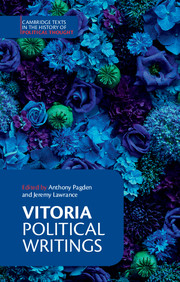Book contents
- Frontmatter
- Contents
- Dedication
- Editors' note
- Abbreviations and sigla
- Introduction
- Principal events in Vitoria's life
- Bibliographical note
- Critical note on texts and translation
- TEXTS
- 1 On Civil Power
- 2 I On the Power of the Church
- 3 II On the Power of the Church
- 4 On Law: Lectures on ST I-II. 90-105
- 5 On Dietary Laws, or Self-Restraint (extract)
- 6 On the American Indians
- 7 On the Law of War
- APPENDICES
- Biographical notes
- Glossary
- List of references
- Index
- Cambridge Texts in the History of Political Thought
3 - II On the Power of the Church
Published online by Cambridge University Press: 05 June 2012
- Frontmatter
- Contents
- Dedication
- Editors' note
- Abbreviations and sigla
- Introduction
- Principal events in Vitoria's life
- Bibliographical note
- Critical note on texts and translation
- TEXTS
- 1 On Civil Power
- 2 I On the Power of the Church
- 3 II On the Power of the Church
- 4 On Law: Lectures on ST I-II. 90-105
- 5 On Dietary Laws, or Self-Restraint (extract)
- 6 On the American Indians
- 7 On the Law of War
- APPENDICES
- Biographical notes
- Glossary
- List of references
- Index
- Cambridge Texts in the History of Political Thought
Summary
The second relection on the power of the Church was delivered in early 1533. P's version is copied by the same hand as I On the Power of the Church (probably that of Fray Andrés de Burgos). Besides being more accurate than the printed texts, Andrés' copy preserves Vitoria's original division into six questions and twenty-seven propositiones.
RELECTION II ON THE POWER OF THE CHURCH OF THE VERY REVEREND MASTER FR. FRANCISCO DE VITORIA, DELIVERED IN SALAMANCA, A. D. 1533
In the other lecture which I gave on this topic last year, I dealt with part of the subject of ecclesiastical power; namely, by what law and when it was set up, the distinction between civil and ecclesiastical power, and the comparisons between the two. Consequently, on this occasion I shall discuss the subjects in whom this kind of power is vested, and other weightier theological questions concerning power.
[Question 1, Single article: Whether the power of the Church belongs to the Church as a whole]
§1 First of all, therefore, we may put the question whether the power of the Church per se is vested in the Church as a whole? That is to say, in the universal Church as distinct from its individual members, by analogy with the way in which civil power is immediately present in the whole commonwealth, as both theologians and philosophers correctly concede. It may seem that it is:
1. By the analogy with secular power, which is vested in the whole commonwealth though it is delegated to the magistracies and other powers within that commonwealth.
- Type
- Chapter
- Information
- Vitoria: Political Writings , pp. 109 - 152Publisher: Cambridge University PressPrint publication year: 1991

